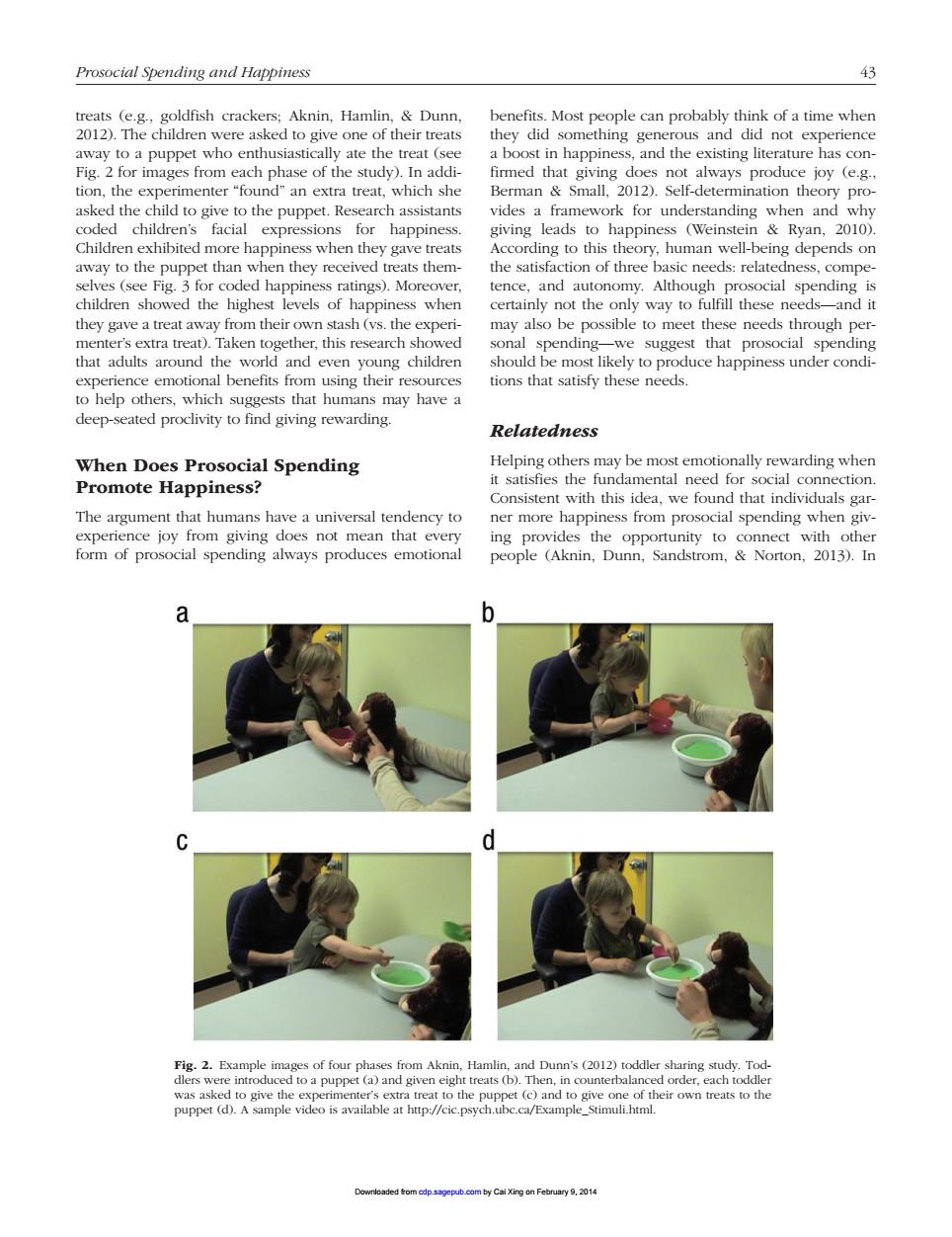正在加载图片...

Prosocial Spending and Happiness 43 benefits.Most people can probably think of a time when o81 ey did not experience firmed that giving does no (e.g tion,the experimenter"found"an extra treat,which she Berman Small,2012).Self-determination theory pro asked the child to give to the puppet.Research assistants vides a framework for understanding when and why expressio happines ibited giving leads to happiness (Weins n,2010 y to the selves (see Fig.for coded happiness ratings).Moreover. tence,and autonomy.Although prosocial spending is children showed the highest levels of happiness when certainly not the only way to fulfill these needsand it they gave a treat away from sh (vs.the may also be possible to meet th needs t hrough per experience emotional benefits from using their resources tions that satisfy these needs. to help others,which suggests that humans may have a deep-seated proclivity to find giving rewarding. Relatedness When Does Prosocial Spending Promote Happiness? The argument that humans have a universal tendency to ner more happiness from prosocial spending when giv. ing provides the opportunity to connect with other people (Aknin,Dunn,Sandstrom,Norton,2013).In s of four phases from Aknin.Hamlin,and Dunn's (2012)toddler sharing study. s were Prosocial Spending and Happiness 43 treats (e.g., goldfish crackers; Aknin, Hamlin, & Dunn, 2012). The children were asked to give one of their treats away to a puppet who enthusiastically ate the treat (see Fig. 2 for images from each phase of the study). In addition, the experimenter “found” an extra treat, which she asked the child to give to the puppet. Research assistants coded children’s facial expressions for happiness. Children exhibited more happiness when they gave treats away to the puppet than when they received treats themselves (see Fig. 3 for coded happiness ratings). Moreover, children showed the highest levels of happiness when they gave a treat away from their own stash (vs. the experimenter’s extra treat). Taken together, this research showed that adults around the world and even young children experience emotional benefits from using their resources to help others, which suggests that humans may have a deep-seated proclivity to find giving rewarding. When Does Prosocial Spending Promote Happiness? The argument that humans have a universal tendency to experience joy from giving does not mean that every form of prosocial spending always produces emotional benefits. Most people can probably think of a time when they did something generous and did not experience a boost in happiness, and the existing literature has confirmed that giving does not always produce joy (e.g., Berman & Small, 2012). Self-determination theory provides a framework for understanding when and why giving leads to happiness (Weinstein & Ryan, 2010). According to this theory, human well-being depends on the satisfaction of three basic needs: relatedness, competence, and autonomy. Although prosocial spending is certainly not the only way to fulfill these needs—and it may also be possible to meet these needs through personal spending—we suggest that prosocial spending should be most likely to produce happiness under conditions that satisfy these needs. Relatedness Helping others may be most emotionally rewarding when it satisfies the fundamental need for social connection. Consistent with this idea, we found that individuals garner more happiness from prosocial spending when giving provides the opportunity to connect with other people (Aknin, Dunn, Sandstrom, & Norton, 2013). In Fig. 2. Example images of four phases from Aknin, Hamlin, and Dunn’s (2012) toddler sharing study. Toddlers were introduced to a puppet (a) and given eight treats (b). Then, in counterbalanced order, each toddler was asked to give the experimenter’s extra treat to the puppet (c) and to give one of their own treats to the puppet (d). A sample video is available at http://cic.psych.ubc.ca/Example_Stimuli.html. Downloaded from cdp.sagepub.com by Cai Xing on February 9, 2014